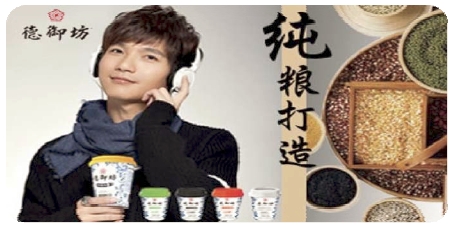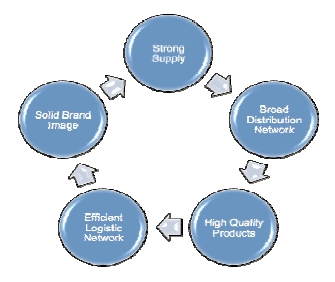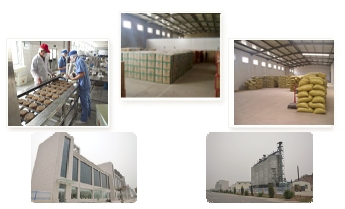On behalf of all of us at Deyu Agriculture Corp., I would like to thank you for your investments and confidence in our Company. We would like to take this opportunity to communicate our ideas of developing our Company to you and explain some of our past decisions, the window opportunity for growth and change, and our present and future financial and operational conditions to you.
Consumers in China are looking more to wholesome foods products. From 2004 to 2009, sales of healthy foods and beverages in China increased 28 percent to $1.5 billion, according to the market-research firm Euromonitor International. Our Company is benefiting substantially from the increasing health consciousness of the Chinese people and as we believe that this trend will continue in the future, we are taking steps to further capitalize on this fortuitous development. Furthermore, inflation and costs of agricultural products are increasing globally; agricultural products have become investment commodities, not to mention investments in agricultural companies with strong storage capacities.
Presently, Deyufarm is still in its investment period and certain related parties are the only source of financing. These investments will be used for promotion, marketing and capacity expansion. Reputation is key in China’s agricultural sector and we are planning Deyufarm’s future very carefully. We are putting a lot of effort into Deyufarm right now because we believe so strongly in its products. Currently, our existing investors are suffering a loss due to these conditions, but we believe Deyufarm’s products will drive our profits in the future and in the process, help reward our shareholders who stay the course. We believe that Deyufarm will generate greater revenues this year and by the end of 2012, we believe Deyufarm may increase its revenues by many multiples.
Benefiting from Bank Loans
In regards to our bank loans and lines of bank acceptance notes (credit lines), management would like to emphasize to our investors that these loans and credit lines from the banks indicate the strengths and potential growths that the banks see in the Company. These loans and credit lines also demonstrate the commitments of our management team to the Company and our shareholders as several key members of management have pledged their personal assets and provided personal guarantees to secure the loans and credit lines. All of the Company’s loans and credit lines are due in 6 months or 1 year, and approximately $26 million are interest-free lines of bank acceptance notes with finance fees at approximately 0.5 percent. The Company expects to early pay back a certain amount of these loans and credit lines before the due dates and will negotiate with the banks to renew every 6 months or 1 year to support the capital needs for continuously growing inventory purchasing and business promotions that come along with the Company’s market expansion.
These bank loans are necessary to achieve our short and long-term goals as they are enabling us to build an economic scale of our business model and retail network. The bank loans would be used mainly for corn purchases, which require prepayment in advance. In addition, we now have sufficient cash for an acquisition and we would not have to shave capital to purchase another company. As an agricultural company, it is vital that we maintain a solid sales network, a broad range of product categories and economies of scale. These bank loans help us sustain and cultivate these aspects of our business.
Internal Control Improvement
We also want to assure you that we are taking measures to increase the timeliness of future fillings. Like our shareholders, we too were displeased with our late 10-Q filing for the first quarter of 2011. Our audit committee and whole management team have put their full attention in this matter. We are in the process of hiring new employees with Big 4 experience and strengthening our filing and reporting mechanism. For our upcoming second quarter 10-Q, our CFO will arrive in Beijing in early July to strengthen our internal controls and to ensure that our report is filed on time.
I hope this overview answered many of your questions. Below you will find answers to other queries you might have.
Q: Discuss the contraction in your margins in the Simple Processed Grain Division?
A: There are many kinds of grains in China, hundreds of them. What we are most familiar with are millets, green beans, etc. For our packed simple processed grain business, most of our products are those which we are familiar with. Because those are more commonly used and widely known, essentially more competitive, it is harder to increase pricing. In the meantime, all purchased costs of agricultural products have continuously increased. All of these were attributed to lower margins. However, we are finding ways of reversing this trend using the strategies discussed under subtitles of Simple Processed Products and “Shop-in-Shop” Model above.
Q: Describe the pathway to profits in the Deep Processed Division
A: Our two pathways are:
| 1. | To boost marketing and advertising efforts to improve sales; and |
| 2. | To maintain sufficient production capacity without too much capacity surplus. |
Q: Deep Processed Grain. For the last few months, management has stated that this division will generate relative high gross margins around 35%. However, in Q1, this division generated only 1% gross margin. What had happened and will happen in Q2? By which quarter will production be running at a relatively high capacity? When will Deep Process Grain division become profitable?
A: Our Deyufarm products are part of our deep processed grain division and as a result of Deyufarm still being in its investment period, our deep processed grain division did not look to achieve a 35 percent gross margin at the pace we previously projected it would. Normally, sufficient production capacity and market demand ensure the high margins of our deep processed grain goods. In Q1, we were limited by inadequate production capacity and a high percentage of outsourcing. Now, we have completed the construction of our new Beijing production line and we expect approval from the Chinese equivalent of the “FDA” in the third quarter of 2011. The Chinese government has increased its inspection standards and consequently, the approval process takes longer than it did in the past. Once the new production line becomes operational, we believe that our capacity will reach a total output of $40 million. We will continue to look at market demand on a variety of deep processed products to determine how we can best utilize our production lines. With sustained funding and business development, we believe 2012 will be a profitable year.
Q: Deyufarm. Please explain how we could avoid this dilution, balance sheet debt and then later buy Deyufarm for 200mm RMB when it cost 70mm RMB. Why don't we get to buy it for 70mm RMB with shareholders’ capital? What about related-party loans?
A: In fact, the related parties are prepared to agree with Deyufarm and Detian Yu that they will not demand to enforce repayments for the period of the Variable Interest Control Agreements being effective.
Our management’s decision-making has to rely upon concurrent business environment and changing situations. Our intent is always for the best interest of the Company and our shareholders. Since the HaoLiangXin acquisition and the Deyufarm incorporation came with great yet inestimable risks and extensive capital outflows, the Variable Interest Control Agreements were commenced for the sake of entering a new yet unknown business sector. However, we are willing to have an open dialogue on any feasible advice with detailed plans for any possible changes, and would be willing to evaluate a number of options included but not limited to:
| | a) | To maintain the status quo by executing new agreements to not enforce repayment of the related-party loans |
| | b) | To terminate the Variable Interest Control Agreements or Deyu management terminating its ownership of Deyufarm in order to eliminate such related-party relationships. However, the financial impact would need to be fully evaluated in both the short term and long term. |
| | c) | To restructure the transaction so that Detain Yu directly owns the equity of Deyufarm via a buyout of Junda and Longyue, except SBCVC with offer price of proportion of callout price of $200 MM RMB according to the Variable Interest Control Agreements. However, in the best interests of Deyu, I am willing to negotiate with Junda and Longyue for them to forgo the agreed callout price and replace it with a fair value price to be determined by independent business valuation professionals. After directly owning Deyufarm, the related-party loans have to be paid back (the proposed loan amendment agreements with Junda and Longyue for loan not being paid back until VIE agreements ineffective is only under current VIE structure). Afterwards, there will be around $15MM needed for this year’s business development and capital expenditures, such as advertisements, branding, market development, factory capacity expansion, etc. How do we come up all of these funds? I simply lay out all the reality and cash need to hope to have a doable agreement for all parties to agree on the details ASAP. I sincerely welcome all suggestions. |
Q: Farmland Title. When will the title finally transfer for the $7mm farmland purchased in Sept. 2010? As of March 31, 2011 the title transfer was still in process. What is the hold up? Better yet, can the Company rescind this transaction and receive back the $7mm initially paid while securing less expensive farmland alternatives so it can be used for working capital instead?
A: We believe it would not be advantageous to sell the farmland since doing so will negatively affect shareholder value. We believe that this farmland and its resources will eventually benefit our businesses in securing our supply and accordingly maximizing shareholder value, which is our main objective.
Presently, we are working with the local government to transfer the title of the farmland to us. Like many government transactions, farmland title transfers are very involved and time consuming. We believe this long process will be worth it and we want our investors to believe the same. Having a steady supply of crops is critical to our business and we believe obtaining this farmland would substantially enhance our resources and allow us to produce more goods. Additionally, we would be eligible for VAT tax exemptions by virtue of the farmland purchase.
Q: Timber and timberland. Why does the Company have rights to timber and timberland given it is a grain company? How is timber and timberland related to grains? Can the Company sell this right for cash given this is not core to its business?
A: Timber and timberland were the first assets of the Company contributed by the original shareholder of Jinzhong Deyu. Indeed these assets do not belong to our core business. However, it takes time to process the sale of these assets given the unique nature of the assets and the approval process of Chinese government on land transactions, and we do not believe that hastily rushing to sell these assets would be in the best interests of our shareholders. Nonetheless, we will attempt to locate a buyer and try to generate profits from a sale.
Q: You recently installed an ERP system, how is that working out for you and when will it be fixed?
A: We implemented our ERP system in Q1. However, implementation of a smooth running system tends to take months. This is indeed the main reason for our Q1 filing extension. We sincerely apologize to our shareholders. At now, we are giving all our efforts to lower this impact by increasing manpower and extensive training to ensure the quality of parallel run for accuracy and timeliness of our financial reporting.
Q: Recent bank loans and lines of bank acceptance notes. $34mm in new loans were drawn in April and May 2011. Why was so much money borrowed? What is short-term purpose of this?
A: The business model of the Company is: cash purchase—stock—sell—accounts receivable—payment collection. In the meantime, we also need to pay off our selling expenses, administrative expenses and listing fees. Short-term cash is an important aspect of our business model. Cash from these loans provide us with the ability to increase our purchases, pay off our accounts payable and ensure a healthy cushion between our receivable collections. We see our ability to access money from Chinese banking sources as a means to further strengthen our financial position and we believe this is the optimal solution for our cash need since this approach provides us with the ability to expand without diluting our shareholders.
In addition, these bank loans will be mainly used for purchasing corn, which is required by the terms of these loans, and the minority of the loans will be used for working capital. At the same time, we intend to look toward strategic acquisitions with current bank debt and cash flow that could reap considerable benefits for shareholders.
Q: Statement regarding the Company's leverage and encumbrances in regard to the large debts compared to total equity.
A: Deyu has reached its max in terms of total debt on hand. We plan on growing by using bank loans for expansion and then converting our existing assets into generating operating cash flow, then using the cash flow for further growth while repaying debt and increasing the net margins.
By investing in our sales market with these bank loans and cash flow from existing assets, we believe our retail network will become more established. We consider our already strong distribution network an intangible asset of the Company and although it is not reflected on our balance sheet, we believe that enhancing our sales network may add significant value to the Company’s potential and market position.
We are committed to providing the highest level of shareholder satisfaction, and look forward to seeing our shareholders grow with us with prosperity ahead. We will post our next report with further updates and the feedback we receive from you.
Sincerely Yours,
JianMing Hao
Chairman and CEO
Deyu Agriculture Corp.









